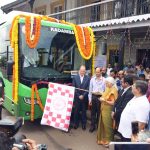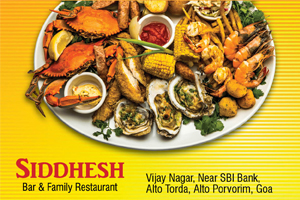KSHITIJ ZARAPKAR
During Ganesh Chaturthi, it is a homecoming for the people. They might not celebrate Diwali in their ancestral house but when it comes to Ganesh Chaturthi they head back home. It is a time when family members come back together as a joint family. They arrive much before Ganesh Chaturthi.
You require a preamble to narrate something new. We live in a country which is spiritual in a big way. We can rather say that we are conveniently spiritual in many ways. That is why there is a culture of remembering God in a collective way before starting any venture. In our regional dialects we call it making “Shree Ganesha”. “Shree Ganesha” is a synonym with starting something new.
Now, when it is a well followed trend how can the world of theatre which strongly believes in fate and divine power lag behind in worshipping Shree Ganesh before kicking off something new?
Right from Dashavatar, a folk-drama form which originated and has been absorbed in the lives of people in Konkan to ‘Tamasha’ lovers in the ghat region, everyone worships the almighty before starting the act. They make a prayer for the hassle-free and successful performance of the act.
In Konkan and Goa such an act of seeking blessing from God is known as ‘naman’ while for the folk form of the act it is called as ‘gan.’ At both the places, the blessings are sought from Lord Ganapati, may be because he is also called as ‘Vignaharta,’ which means the saviour from all evils.
Goa has its own theatre form popularly known as Tiatr which also begins with overture. The reason behind having such a practice is specified in the science of drama.
Before starting the actual play, the artists must have to exercise their vocal cords. This is a universal requirement. It is better to tune your vocal cords before the performance otherwise the audience might just strangle those very cords for delivering an out of tune performance. Naman or gan is a song that all actors have to sing collectively. The science of drama reveals that this helps all the artists to tune their vocal cords which is necessary for the right performance on the stage.
To do this, we usually involve Lord Ganesh so that it gets the necessary spiritual touch in front of a religiously naïve audience; this is a skill that we as artists have honed to ensure box office success.
At this background, it is pertinent to note that the relation between Ganapati Bappa and drama has been from the time immemorial. Mahabharata is India’s biggest epic poetry, we call it as ‘Mahakavya’ in regional languages. The correlation between Mahabharata and Lord Ganesh is much deeper. Here I will refer to drama ‘Sundara Mana Madhye Bharli’, where the artist performing the character of ‘Songadya’ has a dialogue with the ‘Sutradhar’ (the narrator). It is as below:
Songadya: Tatya, who wrote Mahabharata?
Sutradhar: Hmmm!!! It is easy to tell… Vyas wrote Mahabharata.
Songadya: Absolutely wrong!!! Vyas narrated Mahabharat verbally… Ganapati was his stenographer… Now you tell me why did Vyas choose Ganapati as his stenographer?
Sutradhar: What is big in that? Ganapati is a God.. It is natural that Vyas will have his devotee (bhakt) in his HR department.
Songadya: Tatya.. Ganapati was selected due to his skill not with any favour.
Sutradhar: Is it? What kind of skills did he have?
Songadya: Ganapati can use the mouse better…
If we can keep aside the humour in this dialogue, we should consider the meaning deeply imbedded in it. When a writer choses any typist, it is but natural that the skill of the person chosen for typing will naturally reflect in the creativity. There is a strong connect between Lord Ganapati and the art of theatre.
The way Saraswati has been considered as the Goddess of education, Ganapati is the God of knowledge and wisdom. Those who are associated with drama should mandatorily have the knowledge of happenings around, or else how will they project the ethos of our society in a much entertaining way? That is why Ganapati Bappa has been considered as the most revered deity in the theatre.
Stage is a battle field for the artists who have to win the battle with their ammunition of performance skills.
There is another connection between Ganapati Bappa and drama world that is during Ganeshotsav. For eleven days during the festival, the theatres are closed and dramas take centre position at the make shift stages. Several Ganeshotsav mandals organise various dramas as a part of their entertainment package. This is the time to make hay for drama companies who are always completely booked for this season. In the sense, Ganapati is a good omen for these companies.
It is not just a theatre that is appreciated during Ganeshotsav but it is overall culture that blossoms during this time. The ten-day-long festival provides platform for different kind of art forms.
During Ganesh Chaturthi, it is a homecoming for the people. They might not celebrate Diwali in their ancestral house but when it comes to Ganesh Chaturthi they head back home. It is a time when family members come back together as a joint family. They arrive much before Ganesh Chaturthi. Everyone gets busy in preparing for the day. The creative minds are busy putting up decoration while those who are good in cooking contribute in the kitchen.
The eleven days are filled with singing, music and other entertainment activities which keeps everyone busy and entertained. There is a bliss in the atmosphere. This was the picture a few years ago. With the passage of time, the priorities have changed. People are extremely busy in their own life.
Now there is no more rush to get back home for Ganesh Chaturthi. Those living in cities have already kept their own Ganesh Idol which is worshipped. The traditions have changed but faith didn’t. Unlike the past, there are no helping hands to get ready for the festival. The humans are replaced by machines.
The decoration with thermocol has replaced the traditional creative style wherein the natural products were used to set it up. Modaks are no more prepared at home, they are purchased from the market. Not just this, we also ensure that modaks are parceled to our relatives residing abroad. We ensure that their faith in Lord Ganesh and the festival is also kept alive.
Today every nook and corner has sarvajanik Ganeshotsav blocking the roads and creating traffic jams. There is a competition to celebrate the festival with maximum glamour and spending.
The change in our surrounding is inevitable, and we get naturally adopted to it. Finally, the individual wisdom and grasping power makes our culture what it is. I used to live in America few years ago. Even in The United States people celebrate Ganeshotsav with enthusiasm. During one such visit to a house in America, eight year old Neel was explaining to his six year old brother, “you know we celebrate America’s Independence Day on the fourth of July because America was born on that day. Today, our Lord Ganapati Bappa was born. It is Ganesh Chaturthi. The birth of Lord Ganesha.”
Ganapati Bappa Morya!



























